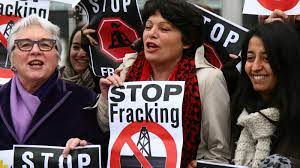From the Office of Fossil Energy and Carbon Management, U.S. DOE, January 14, 2021
Washington, D.C. – The U.S. Department of Energy’s (DOE) Office of Fossil Energy delivered a new report to the President on negative impacts of the ill-conceived hydraulic fracturing ban some have proposed. Economic and National Security Impacts Under a Hydraulic Fracturing Ban explains why a ban would have far-reaching and severe consequences, including the loss of millions of jobs, price spikes at the gasoline pump and higher electricity costs for all Americans—and the likelihood of increased CO2, SO2, and NOx emissions. A ban would end the U.S. role as the world’s largest oil and natural gas producer and would force the United States to become a net importer of oil and gas once again. It would weaken the Nation’s geopolitical influence and put our national security at risk.
“Hydraulic fracturing tapped the great reservoir of America’s natural resources. That technology made the United States the world’s largest oil and natural gas producer, while also creating high-paying jobs and delivering great consumer savings,” said Assistant Secretary for Fossil Energy Steven Winberg. “This report to the President details just how devastating the economic and national security impacts of a ban would be. Banning this technology would derail our recovery from recent COVID-related economic disruptions and increase the risk of another recession.”
During 2019, U.S. LNG exports helped to reduce the trade deficit and created $9.5 billion in revenue. But it is consumers, in particular, who would bear the impacts of a hydraulic fracturing ban.
In recent years, increased domestic oil and natural gas supply has put significant downward pressure on consumer prices for gasoline and natural gas. In 2019, gasoline and diesel prices were 40 percent and 38.3 percent lower, respectively, compared to 2012, and average end-user prices for natural gas fell 24.3 percent in 2019 from 2008 levels.
The report shows how consumers would bear the impacts of a hydraulic fracturing ban through higher electricity and natural gas costs. Retail electricity costs would increase by more than $480 billion between 2021 and 2025, and retail natural gas costs would increase by more than $400 billion between 2021 and 2025.
And the report estimates how much higher gasoline and diesel costs could go if hydraulic fracturing were banned. Annual average gasoline prices would increase over 100 percent to over $4.20 per gallon in 2022 and 2023, and annual average diesel prices would increase 95 percent to $4.56 per gallon in 2022. Higher prices for gasoline, diesel, and petroleum products would amount to $1.9 trillion in additional, cumulative costs from 2021 to 2025 across all sectors.
The shale revolution created by hydraulic fracturing and related technology is also responsible for a well-documented U.S. environmental success record: the reduction of carbon and other emissions to record-low levels. Natural gas is key to that environmental success because it fuels more than one-third of U.S. electric power plants and serves as an important enabler for integrating low-carbon intermittent renewables like wind and solar.
“Taking away hydraulic fracturing technology from America’s oil and natural gas industry removes the primary technique needed to efficiently and responsibly extract abundant U.S. energy resources. Without new wells brought online, U.S. natural gas and oil production would rapidly fall, reversing the past decade’s energy security gains,” said Deputy Assistant Secretary for Oil and Natural Gas Shawn Bennett.
From a national security and foreign policy perspective, significantly curtailing American natural gas and oil production increases global energy dependence on Russia and the member nations of the Organization of the Petroleum Exporting Countries (OPEC). Currently, the U.S. exports natural gas—mostly in the form of LNG—to 39 countries on five continents. A decrease in LNG and crude oil exports would weaken our geopolitical standing globally and take away an important diplomacy tool.
Given the interconnectedness of the global economy, higher energy costs would reverberate across the world, affecting economic growth and the outlook from Asia to Europe. With a weakened American economy, the U.S. would experience a national security setback, becoming reliant, once again, on other nations for its energy needs.
The full extent of the economic, environmental and national security impacts of a ban on hydraulic fracturing is detailed in the report that DOE produced at President’s direction. To learn more about hydraulic fracturing, visit FE’s website.
#######+++++++#######+++++++#######
See Also: Fracking Threatens America’s Air, Water and Climate, Center for Biological Diversity ~ Fracking poisons our water, contaminates our air and emits massive greenhouse gas pollution. {+}
#######+++++++#######+++++++#######
See Also: Fracking Companies Exploiting Halliburton Loophole to Inject Toxic Chemicals, Environmental Protection Online, October 23, 2014
Despite a federal ban on the use of diesel fuel in hydraulic fracturing without a permit, several oil and gas companies are exploiting a Safe Drinking Water Act loophole pushed through by Halliburton to frack with petroleum-based products containing even more dangerous toxic chemicals than diesel. Investigation finds at least 6 fracking fluids on the market with higher concentrations of benzene (a carcinogen) than diesel fuel, and at least 153 wells fracked with liquids containing ethylbenzene (a probable carcinogen) in 11 states.

